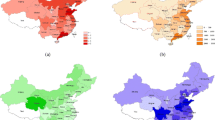Abstract
In the context of emission trading it seems to be taken as given that people's preferences can be ignored with respect to the whole process of fixing emission targets and allocating emission permits to polluters. With this paper we want to reopen the debate on how citizens can be involved in this process. We try to show how citizen preferences can be included in the process of pollution control through emission trading. We propose an emission trading system where all emission permits are initially allocated to households who are then allowed to sell them in the permit market or to withhold (at least some of) them in order to reduce total pollution. This proposal tries to overcome the fundamental disadvantage of traditional permit systems which neglect consumer preferences by solely distributing emission permits to producers / polluters. In our system the property right to nature is re-allocated to the households who obtain the opportunity of reducing actual emissions according to their personal preferences by withholding a part or all of the emission permits allotted to them. Such a change in environmental policy would mark a return to the traditional principles of consumer sovereignty by involving households (at least partially) in the social abatement decision process instead of excluding them. Another advantage of admitting households to the TEP market as sellers or buyers of permits is that this increases the number of agents in the permit market and thus significantly reduces the possibilities of strategic market manipulations.
Similar content being viewed by others
References
Ackerman, F. (1999), ‘Grandfathering and Coal Plant Emissions: The Cost of Cleaning up the Clean Air Act’, Energy Policy 27(15), 929–940.
Andreoni, J. (1989), ‘Giving with Impure Altruism: Applications to Charity and Ricardian Equivalence’, Journal of Political Economy 97, 1447–1458.
Andreoni, J. (1990), ‘Impure Altruism and Donations to Public Goods: A Theory of Warm-Glow-Giving’, The Economic Journal 100, 464–477.
Andreoni, J. (1995), ‘Co-Operation in Public Good Experiments: Kindness or Confusion?’, American Economic Review 85, 891–904.
Baumol, W. J. and W. E. Oates (1971), ‘The Use of Standards and Prices for the Protection of the Environment’, Swedish Journal of Economics 73, 42–54.
Bohm, P. (1972), ‘Estimating Demand for Public Goods’, European Economic Review 3, 111–130.
Cramton, P. and S. Kerr (1998), Tradable carbon permit auctions. How and why to auction not grandfather, University of Maryland, Working Paper published in WWW (http://netec.mcc.ac.uk/WoPEc/data/Papers/pccpccumd98wpTC.html).
Cramton, P. and S. Kerr (1999), ‘The Distributional Effects of Carbon Regulation’, in T. Sterner, ed., The Market and the Environment, Cheltenham: Edward Elgar, pp. 255–271.
Cummings, R., G. Harrison and E. Rutström (1995), ‘Homegrown Values and Hypothetical Surveys: Is the Dichotomous Choice Approach Incentive Compatible?’, American Economic Review 85, 260–266.
Hardin, G. (1968), ‘The Tragedy of the Commons’, Science 162, 1243–1248.
Harrison, D. (1999), Tradable permits for air pollution control: the US experience, in: OECD, Implementing domestic tradable permits for environmental protection, Proceedings of the conference “Domestic Tradable Permit Systems for Environmental Protection: Issues and Challenges”; 1998, Paris.
Hutt, W. H. (1936 / 1990), Economists and the Public — A Study of Competition and Opinion, New Brunswick and London.
Hutt, W. H. (1943), Plan for Reconstruction — A Project for Victory in War and Peace, London.
Johnstone, N. (1999), Permit allocation methods, greenhouse gases, and competitiveness, OECD Working Papers 7(98), Paris.
Klaasen, G. And F. R. Førsund (eds.) (1994), Economic Instruments for Air Pollution Control, Boston.
Knetsch, J. L. (1989), ‘The Endowment Effect and Evidence of Nonreversible Indifference Curves’, American Economic Review, 791277-84.
Madariaga, B. and K. E. McConnell (1987), ‘Exploring Existence Value’, Water Resources Research 23(5), 936–942.
Montero, J.-P. (2000), ‘Optimal Design of a Phase-In Emissions Trading Program’, Journal of Public Economics 75(2), 273–291.
Morrison, G. C. (1997), ‘Resolving Differences in Willingness to Pay and Willingness to Accept: Comment’, American Economic Review 87(1), 236–240.
Schmalensee, R., P. L. Joskow, A. D. Ellerman, J.-P. Montero and E. M. Bailey (1998), ‘An Interim Evaluation of Sulfur Dioxide Emissions Trading’, Journal of Economic Perspectives 12(3), 53–68.
Portney, P. R. (1994), ‘The Contingent Valuation Debate: Why Economists Should Care’, Journal of Economic Perspectives 8, 3–17.
Schneider, F. and W.W. Pommerehne (1981), ‘Free Riding and Collective Action: An Experiment in Public Microeconomics’, Quarterly Journal of Economics 97, 689–702.
Schneider, F. and A. F. Wagner (1998), Emission trading and environmental taxes as efficient flexible instruments for European climate policy: Remarks from an economist's perspective, Research Paper.
Shogren, J. F. and D. J. Hayes (1997), ‘Resolving Differences in Willingness to Pay and Willingness to Accept: Reply’, American Economic Review 87(1), 241–244.
Tietenberg, T. (1998a), ‘Tradable Permits and the Control of Air Pollution — Lessons from the United States’, in H. Bonus, ed., Umweltzertifikate, Zeitschrift für angewandte Umweltforschung, Sonderheft 9, pp. 11–32.
Tietenberg, T. (1998b), ‘Ethical Influences on the Evolution of the US Tradable Permit Approach to Air Pollution Control’, Ecological Economics 24(2), 241–257.
Author information
Authors and Affiliations
Rights and permissions
About this article
Cite this article
Ahlheim, M., Schneider, F. Allowing for Household Preferences in Emission Trading – A Contribution to the Climate Policy Debate. Environmental and Resource Economics 21, 317–342 (2002). https://doi.org/10.1023/A:1015120502007
Issue Date:
DOI: https://doi.org/10.1023/A:1015120502007




